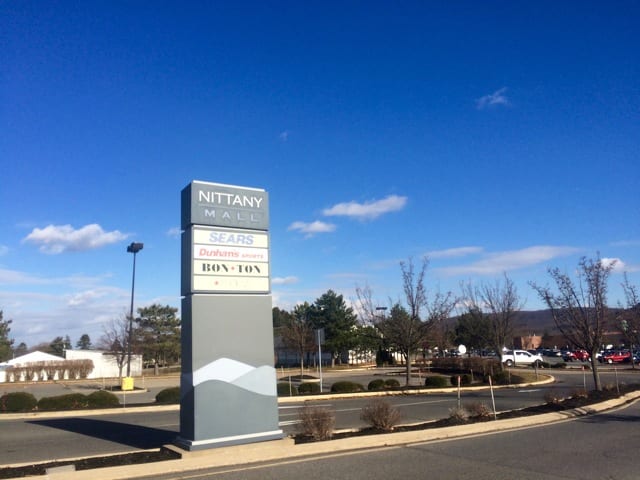Four Centre Region municipalities have passed or are expected to pass resolutions that for now prohibit mini-casinos within their borders.
College Township doesn’t plan to join them.
On Thursday night, township council members agreed to take no action to opt out from consideration as a location for one of the state’s 10 new Category 4 satellite casinos. The major reason for not blocking a casino is that the only feasible location for one to be placed in the township is a portion of the Nittany Mall.
Township Manager Adam Brumbaugh said that no one has contacted the township about interest in a casino at the mall or elsewhere, but gaming could be a boon to the mall’s future.
‘Given the ongoing economic struggles of the Nittany Mall and, that the only viable location for a gaming establishment in College Township is portions of the Nittany Mall, and coupled with the fact that all other Centre Region municipalities have opted out of hosting a Category 4 casino – excepting Halfmoon Township – the Manager strongly believes that casino gaming could be a true and powerful opportunity to redevelop both the Nittany Mall property as well as surrounding commercially zoned properties,’ he wrote in a memo to council members prior to Thursday night’s meeting.
College Township has an adult business ordinance that includes restrictions on where a gaming operation could be placed. That significantly restricts potential locations for a casino. One could only be developed in the C-1 commercial district, which runs along the area of East College Avenue/Benner Pike, and can’t be within 1,000 feet of a residential district boundary, place of assembly, school or park.
That leaves portions of the Nittany Mall as the only location a casino could be placed in the township. Brumbaugh said that with the ordinance, the site for a gaming establishment would be very limited and would not include the entire mall or adjacent parcels.
Nittany Mall management has not replied to a request for comment.
In October, Gov. Tom Wolf signed legislation expanding gambling in Pennsylvania to allow for 10 Category 4 satellite casinos, which can have between 300 and 750 slot machines and 30 table games. The new casinos would be owned and operated by some of the 12 current casino license owners in the state and cannot be placed within 25 miles of an existing casino.
Municipalities have until Dec. 31 to opt out from consideration as a site for a mini-casino, a decision that can be rescinded at a later date. Those that don’t opt out by the end of the year cannot do so in the future, and if a developer chose to build a casino locally, it only would be subject to local zoning ordinances.
The auction process for the Category 4 licenses will begin in January, and council chair Richard Francke said even though the opt-out could be rescinded later, doing so now could mean missing out if a licensee did want to build one locally.
‘This is under an incredibly tight, compressed cycle,’ he said. ‘They’re going to be looking for a spot.’
Vice chair Carla Stilson noted that the chances of a casino being developed at the mall are probably ‘pretty slim,’ but council members agreed the adult business ordinance protects the township while providing a potential opportunity for a significant commercial property.
Councilman Eric Bernier said that the ‘traditional’ shopping mall concept likely isn’t making a comeback, locally or nationally.
‘We do have to look at the future of that parcel,’ Francke added.
Under the state legislation, a host municipality is entitled to collect half of the local assessment paid by the casino — 2 percent of gross revenue from table games and 4 percent of gross revenue from slot machines — an amount that is capped at 50 percent of the municipality’s 2016-2017 budget.
Brumbaugh said Valley Forge Casino Resort, which of existing casinos is closest in number of slots and tables to a Category 4, generated $1,764,771 in 2016 for Upper Marion Township. College Township is in sound financial shape, and that revenue would not be the reason for supporting a casino being developed, but it would be a benefit to the township, he said.
Pennsylvania casinos generated $3.2 billion in revenue in 2016-17. Lawmakers expect the gaming expansion to produce an additional $200 million annually in license fees and taxes.
As negotiations on the gambling expansion were taking place, Pennsylvania Senate Majority Leader Jake Corman, R-Benner Township, told the Centre County Gazette in July that ‘It’s been suggested that State College would be a spot that somebody may want to locate one.”
He said at the time he had previous concerns about gaming expansion but was trying to be objective.
“I’ve never been a gaming vote,” Corman said. “Having said that, I think a lot of the fears that many of us had when gaming first came into place have not come true. The casinos have operated as good corporate citizens, and as a form of entertainment it has not cause a lot of the social issues that many of us were concerned about.’
State College and Ferguson Township have passed resolutions to opt out from consideration as a satellite casino location. Harris Township supervisors indicated they would pass an opt out resolution at their meeting next week and Patton Township supervisors will consider the resolution at their Dec. 13 meeting.



